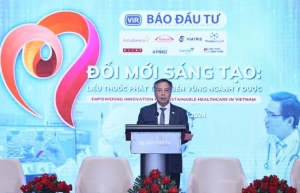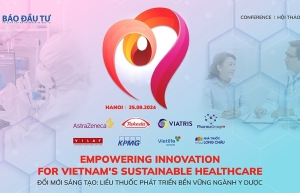Legal reform could woo foreign investment to pharmaceuticals
 |
Vu Van Chung, deputy general director of the Foreign Investment Agency under the Ministry of Planning and Investment said, "Vietnam has attracted 40,000 foreign-led projects so far with registered investment capital of $491 billion. There are 159 foreign-invested projects with a registered investment capital totalling $1.8 billion in the healthcare and pharmaceutical sector. So compared to the total figure of foreign investment in Vietnam, that figure is still quite modest."
Darrell Oh, chairman of Pharma Group at EuroCham, said, "There is no doubt about Vietnam’s potential to pull in foreign investment thanks to its growing domestic market, political and economic stability, and a network of 16 active free trade agreements. However, Vietnam has yet to fully capitalise on these strengths in the pharmaceutical sector."
Oh went on to suggest Vietnam create an environment that is more conducive to business and investment via policies that are predictable and sustainable, a strong commitment to streamlined regulatory processes, and adherence to regulatory timelines and intellectual property protection. Oh also recommended Vietnam focus on incentives that prioritise innovation, such as research and development (R&D) hubs, and early phase investment into product development such as clinical trials and advanced manufacturing capabilities.
"Under the revised Pharmaceutical Law, Vietnam can simplify administrative procedures for the registration of new drug circulation licences and the renewal of old ones. This would make it easier for companies to register new pharmaceutical products, accelerate their rollout to market, reduce costs, and enable lower drug pricing. Meanwhile, the law also encourages technology transfer between foreign and domestic firms in the production of new pharmaceutical products," said Trinh Luong Ngoc, a partner at law firm Vilaf.
 |
Ta Manh Hung, deputy director of the Drug Administration of Vietnam under the MoH, said, "The Law on Pharmacy 2016 has propelled the progress for the pharmaceutical industry. Previously, pharma companies were mainly state-owned enterprises. Today, there are 200 factories operated by private companies. The industry provides enough medicine for the basic medical needs of the people, but after eight years since the law's implementation, some aspects need to be revised."
Hung pointed out some key focus areas, including reforming administrative procedures, increasing access to effective medicines for the people, and innovative investment incentives that focus on new drugs and drugs from medicinal herbs. Policies on drug supply on e-commerce platforms should also be considered.
Le Van Truyen, former Deputy Minister of Health, said, "Vietnam has made many achievements in the pharmaceutical industry. Last year, the industry spent $75 per person in Vietnam, an increase of 150 times from $0.5 just 30 years ago. However, the industry still faces challenges in innovation and creativity with its limited technical facilities in the face of the fourth industrial revolution. The digitalisation process in the pharmaceutical industry remains slow."
"R&D facilities in the pharmaceutical industry remain fragmented and the financial capabilities of local companies are not strong. These factors are hindering the development of the pharmaceutical industry. Hopefully, Vietnam will develop an R&D centre on a national scale that is capable of technology transfer and research. Meanwhile, there will be policies in place to promote transfers between local and foreign companies," he added.
 | VIR conference highlights innovation in Vietnam's healthcare sector A conference organised by Vietnam Investment Review (VIR) themed "Empowering Innovation for Vietnam's Sustainable Healthcare" was held on September 25, offering an opportunity for policymakers and companies to discuss innovation in Vietnam's healthcare sector. |
 | Empowering innovation for Vietnam's sustainable healthcare VIR plans to host a healthcare conference on September 25, expecting to attract about 200 participants, including policymakers, international organisations, senior experts, and those from the business community. |
 | Unlocking the potential of healthcare innovations While health innovation in Vietnam is taking place strongly, many challenges prevent the sector from unlocking its full potential. Do Xuan Tuyen, Deputy Minister of Health, talked to VIR’s Minh Tung about global lessons to improve the situation. |
What the stars mean:
★ Poor ★ ★ Promising ★★★ Good ★★★★ Very good ★★★★★ Exceptional
Related Contents
Latest News
More News
- Wages and Lunar New Year bonuses on the rise (February 09, 2026 | 17:47)
- Temporary relief for food imports as businesses urge overhaul of regulations (February 07, 2026 | 09:00)
- Opella and Long Chau join forces to enhance digestive and bone health (February 06, 2026 | 18:00)
- Vietnam-South Africa strategic partnership boosts business links (February 06, 2026 | 13:28)
- Sun PhuQuoc Airways secures AJW Group support for fleet operations (February 06, 2026 | 13:23)
- Pegasus Tech Ventures steps up Vietnam focus (February 05, 2026 | 17:25)
- The generics industry: unlocking new growth drivers (February 04, 2026 | 17:39)
- Vietnam ready to increase purchases of US goods (February 04, 2026 | 15:55)
- Steel industry faces challenges in 2026 (February 03, 2026 | 17:20)
- State corporations poised to drive 2026 growth (February 03, 2026 | 13:58)

 Tag:
Tag:



















 Mobile Version
Mobile Version